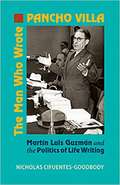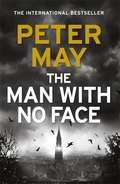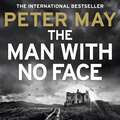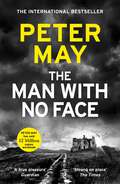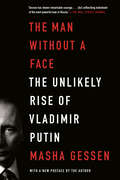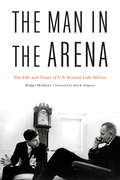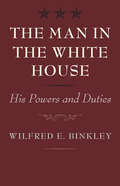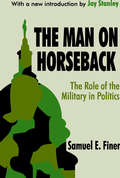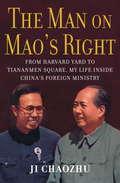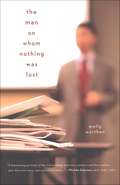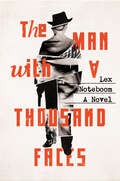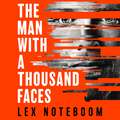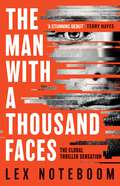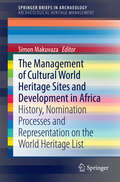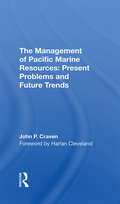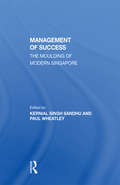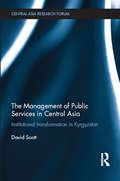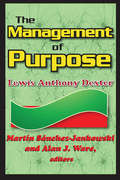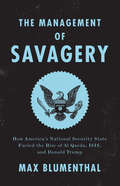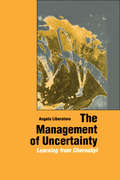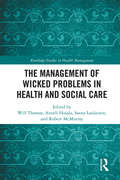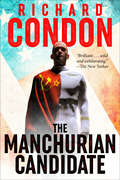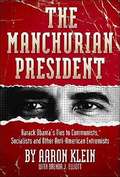- Table View
- List View
The Man Who Wrote Pancho Villa: Martin Luis Guzman and the Politics of Life Writing
by Nicholas Cifuentes-GoodbodyMartin Luis Guzman was many things throughout his career in twentieth-century Mexico: a soldier in Pancho Villa's revolutionary army, a journalist-in-exile, one of the most esteemed novelists and scholars of the revolutionary era, and an elder statesman and politician. In The Man Who Wrote Pancho Villa, we see the famous author as he really was: a careful craftsman of his own image and legacy. His five-volume biography of Villa propelled him to the heights of Mexican cultural life, and thus began his true life's work. Nicholas Cifuentes-Goodbody shapes this study of Guzman through the lens of "life writing" and uncovers a tireless effort by Guzman to shape his public image.The Man Who Wrote Pancho Villa places Guzman's work in a biographical context, shedding light on the immediate motivations behind his writing in a given moment and the subsequent ways in which he rewrote or repackaged the material. Despite his efforts to establish a definitive reading of his life and literature, Guzman was unable to control that interpretation as audiences became less tolerant of the glaring omissions in his self-portrait.
The Man With No Face
by Peter MayA classic early novel from Peter May situated among the political intrigue of Brussels, Belgium, in 1979--now available in the United States."Peter May is a writer I'd follow to the ends of the earth." --Marilyn Stasio, New York Times There are two men on their way to Brussels from the UK: Neil Bannerman, an iconoclastic journalist for Scotland's Daily Standard whose irate editor wants him out of the way, and Kale--a professional assassin.Expecting to find only a difficult, dreary political investigation in Belgium, Bannerman has barely settled in when tragedy strikes. His host, a fellow journalist, along with a British Cabinet minister, are discovered dead in the minister's elegant Brussels townhouse. It appears that they have shot each other. But the dead journalist's young autistic daughter, Tania, was hidden in a closet during the killings, and when she draws a chilling picture of a third party--a man with no face--Bannerman suddenly finds himself a reluctant participant in a desperate murder investigation.As the facts slowly begin to emerge under Bannerman's scrutiny, he comes to suspect that the shootings may have a deep and foul link with the rotten politics that brought him to Brussels in the first place. And as Kale threatens to strike again, Bannerman begins to feel a change within himself. His jaded professionalism is transforming into a growing concern for the lonely and frightened Tania, and a strong attraction to a courageous woman named Sally--drawing him out of himself and into the very heart of a profound, cold-blooded, and infinitely dangerous conspiracy.
The Man With No Face: A powerful and prescient crime thriller from the author of The Lewis Trilogy
by Peter May**THE SUNDAY TIMES BESTSELLER****FROM THE AUTHOR OF THE LEWIS TRILOGY, CAST IRON, AND I'LL KEEP YOU SAFE****PETER MAY: OVER 3 MILLION COPIES SOLD**Can evil be unmasked before it's too late . . . ?A REPORTER WITH NO FEAR1979. Jaded Edinburgh journalist Neil Bannerman is sent to Europe, intent on digging up dirt. Yet it is danger he discovers, when two British men are found murdered.A CHILD WITH NO FATHEROne victim is a journalist, the other a Cabinet Minister: the double-assassination witnessed by the former's autistic daughter. This girl recalls every detail about her father's killer - except for one.THE MAN WITH NO FACEWith those around him rocked by the tragedy, Bannerman is compelled to follow his instincts. He is now fighting to expose a murderous conspiracy, protect a helpless child, and unmask a remorseless killer.LOVED THE MAN WITH NO FACE? Read Peter May's newly reissued thriller, THE NOBLE PATHLOVE PETER MAY? Order his new thriller, A SILENT DEATH(P)2019 Quercus Editions Limited
The Man With No Face: the powerful and prescient Sunday Times bestseller
by Peter May**THE SUNDAY TIMES BESTSELLER****FROM THE AUTHOR OF THE LEWIS TRILOGY, CAST IRON, AND I'LL KEEP YOU SAFE****PETER MAY: OVER 3 MILLION COPIES SOLD**Can evil be unmasked before it's too late . . . ?A REPORTER WITH NO FEAR1979. Jaded Edinburgh journalist Neil Bannerman is sent to Europe, intent on digging up dirt. Yet it is danger he discovers, when two British men are found murdered.A CHILD WITH NO FATHEROne victim is a journalist, the other a Cabinet Minister: the double-assassination witnessed by the former's autistic daughter. This girl recalls every detail about her father's killer - except for one.THE MAN WITH NO FACEWith those around him rocked by the tragedy, Bannerman is compelled to follow his instincts. He is now fighting to expose a murderous conspiracy, protect a helpless child, and unmask a remorseless killer.LOVED THE MAN WITH NO FACE? Read Peter May's newly reissued thriller, THE NOBLE PATHLOVE PETER MAY? Order his new thriller, A SILENT DEATH
The Man With No Face: the powerful and prescient Sunday Times bestseller
by Peter May**THE SUNDAY TIMES BESTSELLER****FROM THE AUTHOR OF THE LEWIS TRILOGY, CAST IRON, AND I'LL KEEP YOU SAFE****PETER MAY: OVER 3 MILLION COPIES SOLD**Can evil be unmasked before it's too late . . . ?A REPORTER WITH NO FEAR1979. Jaded Edinburgh journalist Neil Bannerman is sent to Europe, intent on digging up dirt. Yet it is danger he discovers, when two British men are found murdered.A CHILD WITH NO FATHEROne victim is a journalist, the other a Cabinet Minister: the double-assassination witnessed by the former's autistic daughter. This girl recalls every detail about her father's killer - except for one.THE MAN WITH NO FACEWith those around him rocked by the tragedy, Bannerman is compelled to follow his instincts. He is now fighting to expose a murderous conspiracy, protect a helpless child, and unmask a remorseless killer.LOVED THE MAN WITH NO FACE? Read Peter May's newly reissued thriller, THE NOBLE PATHLOVE PETER MAY? Order his new thriller, A SILENT DEATH
The Man Without a Face: The Unlikely Rise of Vladimir Putin
by Masha GessenThe Man Without a Face is the chilling account of how a low- level, small-minded KGB operative ascended to the Russian presidency and, in an astonishingly short time, destroyed years of progress and made his country once more a threat to her own people and to the world. Handpicked as a successor by the "family" surrounding an ailing and increasingly unpopular Boris Yeltsin, Vladimir Putin seemed like a perfect choice for the oligarchy to shape according to its own designs. Suddenly the boy who had stood in the shadows, dreaming of ruling the world, was a public figure, and his popularity soared. Russia and an infatuated West were determined to see the progressive leader of their dreams, even as he seized control of media, sent political rivals and critics into exile or to the grave, and smashed the country's fragile electoral system, concentrating power in the hands of his cronies. As a journalist living in Moscow, Masha Gessen experienced this history firsthand, and for The Man Without a Face she has drawn on information and sources no other writer has tapped. Her account of how a "faceless" man maneuvered his way into absolute-and absolutely corrupt-power has the makings of a classic of narrative nonfiction. .
The Man in the Arena: The Life and Times of U.S. Senator Gale McGee
by Alan K. Simpson Rodger McDanielThere was a time when Wyoming and other Rocky Mountain and midwestern states were as likely to elect a liberal Democrat to Congress as they were a conservative Republican. Gale McGee (1915–92) was elected to the U.S. Senate in 1958, at the height of American liberalism. He typified what Teddy Roosevelt called “the man in the arena” and was a major player in the development of America’s post–World War II foreign policy and almost every legislative milestone in U.S. history from the 1950s to 1980. McGee’s careers as an academic, a senator, and an ambassador spanned World War II, the Red Scare, the Korean and Vietnam Wars, and the activist Congress of the 1960s. This elegantly conceived biography of a liberal from the conservative rural state of Wyoming offers readers a glimpse into formative political shifts of the twentieth century. The national liberal consensus of the 1960s, in which McGee played a major role, gave the nation Social Security, Medicare, Medicaid, the minimum wage, and the right to collective bargaining, as well as landmark civil rights and environmental reforms. That consensus had ended by the mid-1970s as McGee’s liberalism would no longer be welcome to represent the Equality State. Moving beyond biography, Rodger McDaniel addresses the significant shift in government and details how the attribution “liberal” became a candidate’s epitaph, as widespread distrust of government cast a shadow on the many benefits acquired through the old liberal consensus. McDaniel’s insights into the past as well as McGee’s experiences in the arena shed unexpected light on the present state of U.S. politics and government.
The Man in the White House: His Powers and Duties
by Wilfred E. BinkleyThe Constitution of the United States says little about the president's specific duties other than the enforcement of the laws of the land. Combining brilliant scholarship with a lively style, this book reveals how deep-seated forces, inherent in American society and affecting the presidency for over two centuries, have transformed the office created by the framers of the Constitution into the complex, powerful, and responsible institution it is today.The administrations of the "strong" presidents have added to the powers and duties of the office as we know them. In addition, such social and political forces as the growth of political parties, economic and geographic expansion, and the changing nature of the national government have all had their influence on the presidency. These processes are historically traced by the author and illustrated by vivid examples of how they worked in the case of such holders of the office as Washington, Jackson, Polk, Lincoln, the two Roosevelts, and Eisenhower.Every chapter of the book brings a fresh and authoritative approach to an office and an institution that is the subject of searching debates today.
The Man in the White House: His Powers and Duties
by Wilfred E. Binkley“Mr. Binkley’s interpretations . . . of the Presidency have deservedly been of great influence; and the reasons are evident to the reader of this book.” —The Journal of PoliticsThe Constitution of the United States says little about the president’s specific duties other than the enforcement of the laws of the land. Combining brilliant scholarship with a lively style, this book reveals how deep-seated forces, inherent in American society and affecting the presidency for over two centuries, have transformed the office created by the framers of the Constitution into the complex, powerful, and responsible institution it is today.The administrations of the “strong” presidents have added to the powers and duties of the office as we know them. In addition, such social and political forces as the growth of political parties, economic and geographic expansion, and the changing nature of the national government have all had their influence on the presidency. These processes are historically traced by the author and illustrated by vivid examples of how they worked in the case of such holders of the office as Washington, Jackson, Polk, Lincoln, the two Roosevelts, and Eisenhower.Every chapter of the book brings a fresh and authoritative approach to an office and an institution that is the subject of searching debates today.“Into it he has put all the insight and charm and sense of proportion that have marked each of his remarkable books on American institutions . . . The importance of the presidency in molding our politics and of politics as a weapon of the successful President have never been stated more clearly and conclusively than in these chapters.” —The American Historical Review
The Man on Horseback: The Role of the Military in Politics
by Samuel FinerThe role of the military in a society raises a number of issues: How much separation should there be between a civil government and its army? Should the military be totally subordinate to the polity? Or should the armed forces be allowed autonomy in order to provide national security? Recently, the dangers of military dictatorships-as have existed in countries like Panama, Chile, and Argentina-have become evident. However, developing countries often lack the administrative ability and societal unity to keep the state functioning in an orderly and economically feasible manner without military intervention.Societies, of course, have dealt with the realities of these problems throughout their histories, and the action they have taken at any particular point in time has depended on numerous factors. In the ""first world"" of democratic countries, the civil-military relationship has been thoroughly integrated, and indeed by most modern standards this is seen as essential. However, several influential Western thinkers have developed theories arguing for the separation of the military from any political or social role. Samuel Huntington, emphasized that professionalism would presuppose that the military should intervene as little as possible in the political sphere. Samuel E. Finer, in contrast, emphasizes that a government can be efficient enough way to keep the civil-military relationship in check, ensuring that the need for intervention by the armed forces in society would be minimal. At the time of the book's original publication, perhaps as a consequence of a post-World War II Cold War atmosphere, this was by no means a universally accepted position. Some considered the military to be a legitimate threat to a free society. Today's post-Cold War environment is an appropriate time to reconsider Finer's classic argument.The Man on Horseback continues to be an important contribution to the study of the military's role in the realm of politics, and will be of interest to stu
The Man on Mao's Right
by Ji ChaozhuNo other narrative from within the corridors of power has offered as frank and intimate an account of the making of the modern Chinese nation as Ji Chaozhu’sThe Man on Mao’s Right. Having served Chairman Mao Zedong and the Communist leadership for two decades, and having become a key figure in China’s foreign policy, Ji now provides an honest, detailed account of the personalities and events that shaped today’s People’s Republic. The youngest son of a prosperous government official, nine-year-old Ji and his family fled Japanese invaders in the late 1930s, escaping to America. Warmly received by his new country, Ji returned its embrace as he came of age in New York’s East Village and then attended Harvard University. But in 1950, after years of enjoying a life of relative ease while his countrymen suffered through war and civil strife, Ji felt driven by patriotism to volunteer to serve China in its conflict with his adoptive country in the Korean War. Ji’s mastery of the English language and American culture launched his improbable career, eventually winning him the role of English interpreter for China’s two top leaders: Premier Zhou Enlai and Party Chairman Mao Zedong. With a unique blend of Chinese insight and American candor, Ji paints insightful portraits of the architects of modern China: the urbane, practical, and avuncular Zhou, the conscience of the People’s Republic; and the messianic, charismatic Mao, student of China’s ancient past–his country’s stern father figure. In Ji’s memoir, he is an eyewitness to modern Chinese history, including the Great Leap Forward, the Cultural Revolution, the Nixon summit, and numerous momentous events in Tiananmen Square. As he becomes caught up in political squabbles among radical factions, Ji’s past and charges against him of “incorrect” thinking subject him to scrutiny and suspicion. He is repeatedly sent to a collective farm to be “reeducated” by the peasants. After the Mao years, Ji moves on to hold top diplomatic posts in the United States and the United Kingdom and then serves as under secretary-general of the United Nations. Today, he says, “The Chinese know America better than the Americans know China. The risk is that we misperceive each other. ” This highly accessible insider’s chronicle of a struggling people within a developing powerhouse nation is also Ji Chaozhu’s dramatic personal story, certain to fascinate and enlighten Western readers. A riveting biography and unique historical record,The Man on Mao’s Rightrecounts the heartfelt struggle of a man who loved two powerful nations that were at odds with each other. Ji Chaozhu played an important role in paving the way for what is destined to be known as the Chinese Century. Praise forThe Man on Mao’s Right "Brave, beautifully written testimony . A true "fly-on-the-wall" account of the momentous changes in Chinese society and international relations over the last century. " --Kirkus Reviews “It is a relief to read an account by an urbane and often witty insider who neither idolizes nor demonizes China's top leaders . . . . Highly recommended. "—Library Journal, starred review
The Man on Whom Nothing Was Lost: The Grand Strategy of Charles Hill
by Molly WorthenPsychologically astute and passionately written, Molly Worthen’s remarkable debut charts the intricate relationship between student and teacher, biographer and subject. As a Yale freshman, Worthen found herself deeply fascinated by worldly-wise professor Charles Hill, a former diplomat who had shaped American foreign policy in his forty-year career as an adviser to Henry Kissinger, George Shultz, and Boutros Boutros-Ghali, among others. Hill was never afraid to tell students how to think or what to do, and the Grand Strategy seminar he co-taught had developed a cult following.The Man on Whom Nothing Was Lost is at once the biography of a political insider and the story of how its author evolved as she wrote it. In a moving, highly original work, Worthen conveys the joy and the heartache of uncovering the human being behind one’s idol.
The Man with a Thousand Faces
by Lex NoteboomA fast-paced international political thriller set in a fictitious former Soviet state, in which a new president has to fight for the survival of his family and his nation, and in which nothing and no one is what they seem. Michelle is about to go on vacation with her husband, Daniel, and their children, when they learn that Daniel&’s twin brother has tragically died. They must return to Dan&’s homeland of Kazichia to attend the funeral. Once there, Daniel is pressured into staying—his late brother was the nation&’s president, and now Daniel is his successor. Michelle wants to get back to Amsterdam as soon as possible, but that proves to be no easy task: a rebel leader is trying to unite the people in an uprising against the regime. No one knows who the leader is or how he gets his resources, but he has a growing rebel army behind him and is carrying out attacks. As Russian intelligence and the CIA meddle in the conflict, and Michelle does everything she can to get her family home safely, Daniel battles the elusive rebel known as the Man with a Thousand Faces.Fans of John le Carré, Ian Fleming, John Grisham, and Lee Child will be captivated by this propulsive thriller.
The Man with a Thousand Faces: The gripping, unputdownable debut from the global thriller sensation!
by Lex Noteboom'A stunning debut, more modern than tomorrow' TERRY HAYESA soldier with no name looking for a man that no one has ever seen. A student with a past she can't remember. And a husband who is a loving father... or a ruthless despot. Michelle lives a quiet life in Amsterdam with her husband Daniel and their family. But when Daniel's twin, the President of Kazichia, suddenly dies in a car crash, Daniel has no choice but to return home for the first time in twenty years, and Michelle follows along.From the moment they arrive, Daniel is pressured to succeed his brother as President. Kazichia, a former Soviet state, has been ruled by his family for three generations, and now that the throne is empty, the country is left teetering on a knife-edge.As tensions begin to rise, Michelle feels more and more that they should flee. But when an anonymous rebel leader - known only as The Man With a Thousand Faces - initiates a full-blown attack, Daniel decides to step in. But will he be able to lead the country through the crisis? And if he does, will he be able to give up his newfound power? Or will Michelle lose her husband to his own hunger for greater political reign?In a world of fake news and big data, lines between fiction and reality are blurred. And the mythical figure behind it all is THE MAN WITH A THOUSAND FACES.
The Man with a Thousand Faces: The gripping, unputdownable debut from the global thriller sensation!
by Lex Noteboom'A stunning debut, more modern than tomorrow' TERRY HAYESA soldier with no name looking for a man that no one has ever seen. A student with a past she can't remember. And a husband who is a loving father... or a ruthless despot. Michelle lives a quiet life in Amsterdam with her husband Daniel and their family. But when Daniel's twin, the President of Kazichia, suddenly dies in a car crash, Daniel has no choice but to return home for the first time in twenty years, and Michelle follows along.From the moment they arrive, Daniel is pressured to succeed his brother as President. Kazichia, a former Soviet state, has been ruled by his family for three generations, and now that the throne is empty, the country is left teetering on a knife-edge.As tensions begin to rise, Michelle feels more and more that they should flee. But when an anonymous rebel leader - known only as The Man With a Thousand Faces - initiates a full-blown attack, Daniel decides to step in. But will he be able to lead the country through the crisis? And if he does, will he be able to give up his newfound power? Or will Michelle lose her husband to his own hunger for greater political reign?In a world of fake news and big data, lines between fiction and reality are blurred. And the mythical figure behind it all is THE MAN WITH A THOUSAND FACES.
The Management Of Cultural World Heritage Sites and Development In Africa
by Simon MakuvazaEver since the signing of the World Heritage Convention 40 years ago and ratified by 33 African countries, to date, only 43 cultural heritage sites have been successfully proclaimed as World Heritage Sites in Africa. These include archaeological and historical sites, religious monuments and cultural landscapes This book is a re-evaluation of the nomination and management of cultural World Heritage sites in Africa from the late 1970s when the Island of Gorée of Senegal and the Rock-Hewn Churches of Ethiopia were first inscribed on the WHL until today It considers whether a credible and well balanced WHL has been attained, especially in regards to the nomination of more sites in Africa. The book also examines the roles and contribution of various heritage organizations and African governments to the nomination and management of cultural World Heritage sites in Africa. Lastly, the volume also scrutinizes economic development, which may result from the nomination and successful management of cultural World Heritage sites in Africa.
The Management Of Pacific Marine Resources: Present Problems And Future Trends
by John P CravenThe mineral, food, and energy potential of the oceans increases in importance as land-based resources approach their ultimate limits. International planning for the utilization of common ocean areas beyond territorial waters has thus become a vital task, one made difficult by competition among nations and the unregulated operations of multinational
The Management Of Success: The Moulding Of Modern Singapore
by Paul Wheatley Kernial Singh Sandhu Kernial Singh Sandhu (A)A collection of analytical reflections on how the island of Singapore has been transformed from a colony in a crumbling empire into a thriving, modern, secular, independent republic. These are the results of a five-year project by the Institute of Southeast Asian Studies.
The Management of Public Services in Central Asia: Institutional Transformation in Kyrgyzstan (Central Asia Research Forum)
by David ScottThe ending of the Soviet Union in 1991 had a major political and economic impact on Central Asia. Kyrgyzstan was one of the most severely affected countries, suffering a deeper recession than the other republics. During the first five or six years Kyrgyzstan followed the advice of the International Monetary Fund and was considered a model of both economic and political reform. This book analyses the ability of the newly independent government in Kyrgyzstan to create a realistic national vision, prepare a strategy, organise and control its public services to deliver the desired result. Covering a fifteen year period and using the case study of the educational sector – which declined even though the economic situation in Kyrgyzstan improved – the author throws light on many other aspects of a country in transition, in particular, on strategy, implementation and outcomes. Comparisons with other sectors such as roads and pensions, and in particular the health care sector are presented. A multifaceted approach using case studies, phenomenology, interviews, historical and comparative analyses offers a more complete picture of national management of public service and the structure of government administration. The book also investigates the contribution made by the international aid organisations. A detailed study of institutional transformation in Kyrgyzstan, this book is of interest to academics studying former socialist countries in transition, the history of the Soviet Union and Central Asian studies in general.
The Management of Purpose
by Lewis Anthony DexterLewis Anthony Dexter may well have been one of the better known and least appreciated political scientists of the last century. This outstanding collection of Dexter's writings, demonstrates why Dexter remains important. The volume off ers solid reasons for researching the topics Dexter pioneered, and is a masterful guide to his thought and analyses. Dexter's writings derive from a multifaceted career. The Management of Purpose is organized into three broad subject areas: sociology, political science, and practicing social science. Dexter's notions of what constituted sociology and anthropology and his understandings of these areas and how to use them to illumine political matters are unusual. His use of multiple types of evidence, including history and logic, enables him to make significant contributions to the study of society's response to social problems. His work on labeling theory shows that social labels have a power that both transcends and distorts reality. Dexter was also a pioneer in the interactionist perspective, linking the labeled and those doing the labeling, and in demonstrating how organizations tend to compartmentalize and specialize. Dexter's work provides the analytic tools to enable readers to better understand many of the issues that remain a part of the American political landscape.
The Management of Savagery: How America's National Security State Fueled the Rise of Al Qaeda, ISIS, and Donald Trump
by Max BlumenthalThe rise of international jihad and Western ultra-nationalismIn the Management of Savagery, Max Blumenthal excavates the real story behind America’s dealings with the world and shows how the extremist forces that now threaten peace across the globe are the inevitable flowering of America’s imperial designs. Washington’s secret funding of the mujahedin provoked the Russian invasion of Afghanistan in 1979. With guns and money, the United States has ever since sustained the extremists, including Osama Bin Laden, who have become its enemies. The Pentagon has trained and armed jihadist elements in Afghanistan, Syria, and Libya; it has launched military interventions to change regimes in the Middle East. In doing so, it created fertile ground for the Islamic State and brought foreign conflicts home to American soil. These failed wars abroad have made the United States more vulnerable to both terrorism as well as native ultra-nationalism. The Trump presidency is the inevitable consequence of neoconservative imperialism in the post–Cold War age. Trump’s dealings in the Middle East are likely only to exacerbate the situation.
The Management of Uncertainty: Learning from Chernobyl
by Angela LiberatoreThis investigative analysis studies why key European countries responded differently to the Chernobyl nuclear disaster, and what can be learned from it.The author details why the accident was defined differently in various countries, why actions were or were not taken, and what was learned about the management of nuclear risk. Furthermore, Liberatore studies the short-term and long-term responses and consequences of Chernobyl not only in specific countries, but within the European Union as a whole. Liberatore also provides a policy communication model to illustrate the interaction among the key personnel in such incidents: the scientists, the politicians, the interest groups, and the mass media. The author's focus upon uncertainty managementis a compelling account for all who seek to understand and improve the practical management of transboundary risks.
The Management of Wicked Problems in Health and Social Care (Routledge Studies in Health Management)
by Will Thomas Robert McMurray Anneli Hujala Sanna LaulainenAt a time of growing pressure on health and social care services, this book draws together contributions which highlight contemporary challenges for their management. Providing a range of contributions that draw on a Critical Management Studies perspective the book raises macro-level concerns with theory, demographics and economics on the one hand, as well as micro-level challenges of leadership, voice and engagement on the other. Rather than being an attempt to define the ‘wickedness’ of problems in this field, this book provides new insights designed to be of interest and value to researchers, students and managers. Contributions from international researchers explore four main topics: identifying contemporary challenges in health and social care; managing, leading and following; listening to silent voices in delivering change; and new methodologies for understanding care challenges. The concerns discussed in this volume are ‘wicked’ in so far as they are persistent, pernicious and beyond the curative abilities of any single organisation or profession. Such problems require collaboration but also new approaches to listening to those who suffer their effects. This book demonstrates such listening through its engagement with policy makers, leaders, followers, professions, patients, forgotten groups and silenced voices. Moreover, it considers how future research might be transformed so as to shine a more inclusive light on ‘wicked’ problems and their amelioration. This is a timely and engaging book that challenges you – the reader – to think again about how we should look at, engage with and support all those involved in health and social care.
The Manchurian Candidate (Read-along Ser.)
by Richard CondonThe classic thriller about a hostile foreign power infiltrating American politics: &“Brilliant . . . wild and exhilarating.&” —The New Yorker A war hero and the recipient of the Congressional Medal of Honor, Sgt. Raymond Shaw is keeping a deadly secret—even from himself. During his time as a prisoner of war in North Korea, he was brainwashed by his Communist captors and transformed into a deadly weapon—a sleeper assassin, programmed to kill without question or mercy at his captors&’ signal. Now he&’s been returned to the United States with a covert mission: to kill a candidate running for US president . . . This &“shocking, tense&” and sharply satirical novel has become a modern classic, and was the basis for two film adaptations (San Francisco Chronicle). &“Crammed with suspense.&” —Chicago Tribune &“Condon is wickedly skillful.&” —Time
The Manchurian President: Barack Obama's Ties to Communists, Socialists and Other Anti-American Extremists
by Aaron KleinThe book uncovers a far-leftist, anti-American nexus that has been instrumental in not only helping build Obama's political career but in securing his presidency. Klein details with shocking precision how this nexus continues to influence Obama and the White House and is involved in drafting policy aimed at reshaping our country. Highlights of the book: Obama's mysterious college years unearthed, shocking details of Obama's relationship with Bill Ayers and other Weathermen terrorists, Obama's ties to Islam and black liberation theology, startling facts about Obama's eligibility to serve as president, Obama's membership in a socialist party probed.
